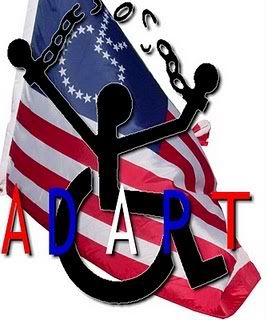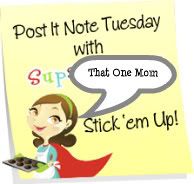The topic for this week’s disability blog carnival is “ what professionals should know about disability.” I am going to twist that around a little bit and write about “what professionals have learned about disability.” I feel like a broken record talking about my workshop so much but it’s my pride and joy. It’s my baby. For those of you who don’t know I spent a year of my life (Nov 06-Nov 07) completely consumed with planning a disability awareness workshop, Disability & the Human Service Worker, as an independent study for the Family Studies and Community Development Department at Towson University. My main goals? To teach future human service workers that people with disabilities are just like everybody else and to give them somewhat of a conceptual framework as to what disability actually is.
If you poll a bunch of family studies majors as to what their future career goals are, a popular answer is working with special needs children. Then you poll a few family studies majors as to what the first thought is that comes to mind when they hear the word disability. You get answers such as the elderly, people who cannot work, young children, and people in wheelchairs. My first thought to that? What the he!! am I then? My department is small. We take classes with the same people over and over. Even if they don’t know my name I would be willing to bet that 90% of family studies students know who I am. I’m hard to miss, being the token gimp and all. I am a 22-year-old college student in a very structured pre-professional university program, who just happens to have CP and bipolar disorder. I am neither elderly nor a young child. I do not work now, but I am a full time student and I volunteer 1-2 days a week. I will of course work after I have my degree. There is no reason why I should not be working. As to the wheelchair thing, I’m on the fence with that one. I happen to have 2 wheelchairs in my possession, but I don’t use them all that often.
My second thought? I would not want any of you working with my (fictitious) disabled child. In fact it scared me half to death to think that people being trained in the human services are left to go out into the real world with no real knowledge of disability whatsoever. My classic example? Say you don’t want to work with the special needs population at all, say you want to work in crisis intervention. Say you work at a battered woman’s shelter and a woman comes in with her son who is autistic. What then? My workshop was 3 hours long and was divided into 4 parts. In attendance were 120 undergraduate students (mostly family studies majors, but I know there was at least 1 OT major there as well) and 30 professors, other professionals, or invited guests. The first part of the workshop was opening remarks by the dean of the college of liberal arts, the director of disability support services, and then me. Which of these Towson Students has a disability? How about all of them. I don’t like listing people by disability, but at this table we have CP & anxiety, CP & bipolar, dysgraphia & ADD, hearing loss and depression, legally blind as a byproduct of albinism, and ADD. That will teach them that we are just like everybody else.
My workshop was 3 hours long and was divided into 4 parts. In attendance were 120 undergraduate students (mostly family studies majors, but I know there was at least 1 OT major there as well) and 30 professors, other professionals, or invited guests. The first part of the workshop was opening remarks by the dean of the college of liberal arts, the director of disability support services, and then me. Which of these Towson Students has a disability? How about all of them. I don’t like listing people by disability, but at this table we have CP & anxiety, CP & bipolar, dysgraphia & ADD, hearing loss and depression, legally blind as a byproduct of albinism, and ADD. That will teach them that we are just like everybody else.
We then immediately went into a 5-student panel where we talked about our experiences with disability. Our major emphasis was what we want (future) human service workers to know. On the panel we had me and the other person with CP mentioned above, a student with a TBI from a car accident, a student with oral facial digital syndrome, and a student with dyslexia & lupus. There were 3 family studies undergrads, 1 phys ed undergrad, and 1 speech & language pathology grad student. (insert sarcasm here) People with CP can get masters degrees? Geez, you learn something new everyday, don’t you? (end sarcasm) That will teach them that we are just like everyone else.
Then we had Disability Jeopardy. The categories were Name that Disability, Community Resources, Disability Related Professionals, US Law & Disability, and Famous People with Disabilities. The final Jeopardy answer was what is people first language? To level the playing field I hid all the answers within a disability dictionary. There were almost 4X as many definitions as there were Jeopardy questions, so I don’t think I was giving it away.
Lastly we had 3 professionals speak about their career working with people with disabilities. We had the director of Towson Disability Support Services, a therapeutic recreation specialist from Mt Washington Pediatric Hospital, and someone from blind & low vision services of voc rehab, who just happened to be blind. We also had many brochures out from various disability related organizations.
Like any good workshop there was a feedback form at the conclusion. What did you like? What could we improve? Etc etc. Out of 150 people we got 86 feedback forms back. The last question was please list the one fact that most stuck in your mind (it could either be the most shocking, most thought provoking, most interesting, etc.). I wanted to know if I really did teach people what I set out to teach them. Some of the responses are purely statistically based (i.e. almost 1 out of 5 people in the US have a disability) or about the professional panel. Others about the student panel I will list below:
• 14 people noted that everyone has his/her own unique story
• 3 people commented on how disability affects a whole family
• 6 people commented on how a lot of disabilities are invisible
• 7 people commented on how people with disabilities want to be as independent as possible and don’t actually want help (most of the time)
• 2 people noted that we should treat people with disabilities just like everybody else
• 1 person commented on the fact that I made a point of saying that disability means that we do things differently, not that we can’t do most things
• 1 person commented on the fact that we would rather people came up to us and asked us questions instead of just staring at us
So did I give future human service workers a conceptual framework of what disability is and teach them that we are just like everybody else? I think I did. Teaching 120 students was a good start. I feel like I am making a good dent towards eradicating ableism, but I also know that this is only the beginning. I am a woman who has just embarked on a mission. Come talk to me in 10 years. Will I have taught this to 1200 students? 12000 students? Aside from this particular workshop I have also spoken to established professionals. Will I have reached more of them? Will I have reached the parents of the children I will have worked with? How will this affect the world? How will this affect us? Well, more understanding should greatly level the playing field and reduce the frustration that is felt from doing mundane ordinary things like going to have a mammogram for example. With a more level playing field and less frustration we will have a greater worth in society as well as more time and energy to reach out to even more and more people…


















0 comments:
Post a Comment